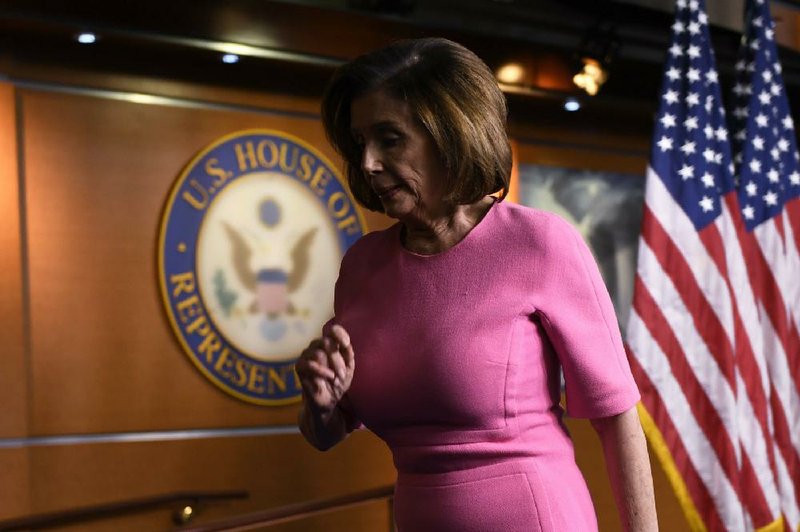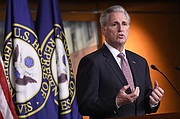WASHINGTON -- Washington is about to deliver unprecedented legislation to speed help to individuals and businesses as the coronavirus pandemic takes a devastating toll on the U.S. economy and health care system.
The House is set to pass the $2.2 trillion measure this morning after a 96-0 Senate vote late Wednesday. President Donald Trump marveled at the unanimity Thursday and is eager to sign the package into law.
It is unlikely to be the end of the federal response. House Speaker Nancy Pelosi said Thursday that issues like more generous food stamp payments, aid to state and local governments, and family leave may be revisited in subsequent legislation.
"There's so many things we didn't get in ... that we need to," Pelosi, D-Calif., told reporters Thursday.
[CORONAVIRUS: Click here for our complete coverage » arkansasonline.com/coronavirus]
But Minority Leader Kevin McCarthy, R-Calif., was cool to the idea of Congress tackling another bill in a matter of weeks.
"Let's let this bill work," he said, before considering next steps.
Meanwhile, Federal Reserve Chairman Jerome Powell said Thursday that the economy "may well be in recession" already and the government reported a 3.3 million burst of weekly jobless claims, nearly five times the previous record.
The legislation will pour $1,200 direct payments to individuals and a flood of subsidized loans, grants, and tax breaks to businesses facing extinction in an economic shutdown caused as Americans self-isolate by the tens of millions.
[Video not showing up above? Click here to watch » https://www.youtube.com/watch?v=YCn0BkO-hlI]
It dwarfs previous Washington efforts to take on economic crises and natural disasters, such as the 2008 Wall Street bailout and former President Barack Obama's first-year economic recovery act.
Key elements of the bill are untested, such as grants to small businesses to keep workers on payroll and complex lending programs to larger businesses. Millions of rebate payments will go to people that have retained their jobs.
Policymakers worry that bureaucracies like the Small Business Administration may become overwhelmed, and conservatives fear that a new unemployment benefit will dissuade jobless people from returning to the workforce.
It would substantially expand jobless aid, providing an additional 13 weeks and a four-month enhancement of benefits, and would extend the payments for the first time to freelancers and gig workers.
A new $500 billion subsidized lending program for larger businesses is unproven as well.
KENTUCKIAN OPPOSED
Pelosi and McCarthy agreed to approve the measure with a voice vote today that would not require all 430 current members of the House to travel to the Capitol, given that two lawmakers have contracted the disease and others are self-quarantining over exposure to confirmed carriers.
The leadership also is taking steps to change the protocol for debate and voting to ensure the safety of lawmakers.
But at least one lawmaker is considering upending the plans for swift passage. Rep. Thomas Massie, R-Ky., said Thursday that he opposed the bill, because it would add to the national debt. The libertarian lawmaker also is concerned that voting without a quorum present would violate the Constitution. He said he has yet to decide whether to press the issue, which could delay a House vote until late Saturday or Sunday.
[Gallery not loading above? Click here for more photos » arkansasonline.com/327pelosi/]
At the White House on Thursday, Trump acknowledged that one House member could slow the process.
"You might have one grandstander and for that we'll have to come back and take a little more time and it'll pass, it'll just take a little longer. But let's see whether or not we have a grandstander," Trump said.
Massie traveled from his Kentucky home to Washington on Wednesday in anticipation of the final vote.
"What the American people should ask is not, why is one guy asking for everybody to follow the Constitution, but why can't these other people who are getting paid $174,000 make the same trip that the truckers are making that are bringing the food to the grocery stores?" he asked.
Pelosi said she was ready to defeat such an effort.
Only lawmakers who are overseeing the debate and those directly scheduled to speak will be permitted into the House chamber during the debate, according to a memo issued by the House sergeant-at-arms. Elevator rides are limited to two people.
The situation is so fluid some lawmakers do not know whether they should attend today's proceedings.
Rep. Alexandria Ocasio-Cortez, D-N.Y., has already returned to Washington, at a moment when federal health experts have suggested anyone in the New York region self-quarantine for two weeks because the area has been the epicenter of the U.S. outbreak.
In a brief interview Thursday, she said she is asking for guidance about whether she can participate in the debate or just submit a video statement.
Ocasio-Cortez has been considering voting against the legislation. She carried out her own internal debate Thursday through her Twitter account, both criticizing Republicans for "holding hostage" hospitals and workers in exchange for what she deemed a corporate bailout -- but also praising nearly $1 trillion in funds.
SENATE APPROVAL
Wednesday night's 96-0 Senate vote on the bill ended in a united front that followed days of sometimes tumultuous negotiations and partisan flare-ups. Democrats twice voted to block the bill to seek further add-ons and changes.
The Senate vote unfolded as covid-19 took its toll on that chamber, as well. Sen. Rand Paul, R-Ky., was absent because he has contracted the coronavirus, while two Utah Republicans, Mitt Romney and Mike Lee, remain in self-isolation after spending time with Paul. Sen. John Thune of South Dakota, the No. 2 Senate Republican, missed the vote because he was not feeling well, a spokesman said, and had returned home out of an abundance of caution.
After Wednesday's vote, Sen. Mitch McConnell, R-Ky., the majority leader, said the Senate is not scheduled to return until April 20.
Underscoring the effort's sheer magnitude, the bill finances a response with a price tag that equals half the size of the entire $4 trillion-plus annual federal budget. The $2.2 trillion estimate is the White House's best guess of the spending it contains.
The rescue bill would provide one-time direct payments to Americans of $1,200 per adult making up to $75,000 a year and $2,400 to a married couple making up to $150,000, with $500 payments per child.
Unemployment insurance would be made far more generous, with $600 per week tacked onto regular state jobless payments through the end of July.
States and local governments would receive $150 billion in supplemental funding to help them provide basic and emergency services during the crisis.
"We call them checks in the mail, but most of them will be direct deposits," Treasury Secretary Steven Mnuchin told CNBC on Thursday. "It will be within three weeks. We're determined to get money in people's pocket immediately."
BUSINESS RELIEF
The legislation also establishes a $454 billion program for guaranteed, subsidized loans to larger industries in hopes of leveraging up to $4.5 trillion in lending to distressed businesses, states and municipalities. All would be up to the Treasury Department's discretion, though businesses controlled by Trump or immediate family members and by members of Congress would be ineligible.
There was also $150 billion devoted to the health care system, including $100 billion for grants to hospitals and other health care providers buckling under the strain of covid-19 caseloads.
Republicans successfully pressed for an employee retention tax credit that's estimated to provide $50 billion to companies that retain employees on payroll and cover 50% of a worker's paycheck up to $10,000. Companies would also be able to defer payment of the 6.2% Social Security payroll tax. A huge business tax break for interest costs and operating losses that was taken away by the 2017 tax code overhaul was restored at a $200 billion cost.
An additional $45 billion would fund additional relief through the Federal Emergency Management Agency for local response efforts and community services.
Once passed by both houses, the measure would be the third emergency bill approved by Congress this month to address the pandemic. Trump previously signed into law both $8.3 billion in emergency aid and a sweeping package providing paid leave, free coronavirus testing and additional aid for families affected by the pandemic.
Most people who contract the new coronavirus have mild or moderate symptoms, such as fever and cough that clear up in two to three weeks. For some, especially older adults and people with existing health problems, it can cause more severe illness, including pneumonia, or death.
The U.S. death toll has surpassed 1,100 from the virus.
Information for this article was contributed by Andrew Taylor and Alan Fram of The Associated Press; by Emily Cochrane and Nicholas Fandos of The New York Times; and by John Wagner, Paul Kane and Mike DeBonis of The Washington Post.
A Section on 03/27/2020

